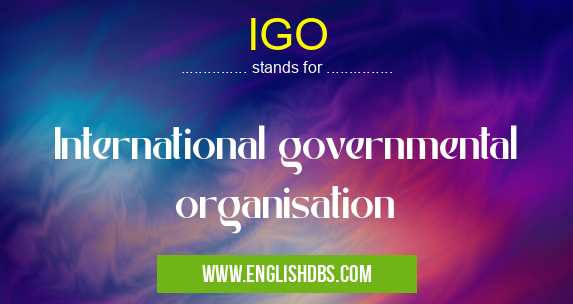What does IGO mean in INTERNATIONAL
IGO stands for International Governmental Organization and refers to organizations composed of member states that are sovereign nations. IGOs play a crucial role in facilitating cooperation and collaboration between countries on a global scale.

IGO meaning in International in International
IGO mostly used in an acronym International in Category International that means International governmental organisation
Shorthand: IGO,
Full Form: International governmental organisation
For more information of "International governmental organisation", see the section below.
Formation and Purpose
IGOs are typically established through international treaties or agreements between member states. Their primary purpose is to address common issues and challenges that transcend national borders, such as:
- Promoting peace and security
- Fostering economic development
- Protecting human rights
- Safeguarding the environment
- Regulating international trade
Structure and Governance
IGOs have varying structures and governance models, but typically consist of the following:
- Assembly of Member States: The governing body that sets policy and makes decisions.
- Secretariat: The administrative and operational arm of the organization.
- Specialized Agencies and Commissions: Bodies that focus on specific areas of expertise, such as health, labor, or finance.
Funding and Membership
IGOs are primarily funded through contributions from member states, supplemented by voluntary funding from private or non-governmental organizations. Membership in IGOs is open to sovereign states that meet specific criteria and are willing to adhere to the organization's charter and principles.
Notable Examples
Some well-known IGOs include:
- United Nations (UN)
- World Trade Organization (WTO)
- World Health Organization (WHO)
- International Monetary Fund (IMF)
- North Atlantic Treaty Organization (NATO)
Essential Questions and Answers on International governmental organisation in "INTERNATIONAL»INTERNATIONAL"
What is an IGO?
An International Governmental Organization (IGO) is a multilateral organization composed of sovereign states that have come together to cooperate on a common goal or set of goals. IGOs are typically created by treaty and have a permanent secretariat and membership.
What is the purpose of IGOs?
IGOs serve a variety of purposes, including:
- Promoting international cooperation and dialogue
- Developing and enforcing international norms and standards
- Providing a forum for negotiation and dispute resolution
- Coordinating policies and programs between member states
- Providing technical and financial assistance to member states
What are some examples of IGOs?
Some well-known IGOs include:
- United Nations
- World Bank
- International Monetary Fund
- World Health Organization
- International Labour Organization
How are IGOs funded?
IGOs are typically funded through a combination of membership dues, voluntary contributions, and grants from governments and other organizations.
What are the benefits of IGOs?
IGOs can provide a number of benefits to their member states, including:
- Increased cooperation and coordination on global issues
- Improved global governance and stability
- Access to technical and financial resources
- A platform for dialogue and negotiation
What are the challenges facing IGOs?
IGOs can face a number of challenges, including:
- Bureaucracy and slow decision-making
- Lack of enforcement mechanisms
- Dominance by powerful states
- Limited resources
Final Words: IGOs are vital platforms for international cooperation, enabling countries to address global challenges, promote shared interests, and foster sustainable development. By providing a structured framework for collaboration, IGOs contribute to a more peaceful, prosperous, and interconnected world.
IGO also stands for: |
|
| All stands for IGO |
